Patient Stories
Jagoda Bach

Jagoda Bach
My husband and I married in 2015 (July 11 (that number is significant!), to be exact) after being together for a few years. We wanted to start a family soon thereafter, as we both wanted a large family. I was praying for two boys and two girls; he just wanted a large family with at least one boy. In 2017, we found out I was pregnant with no complications. I developed pre-eclampsia at 35 weeks and ended up getting induced at 36 weeks and 4 days. My original due date was August 4; our little angel came in the very early hours of July 11, 2018.
Postpartum, I felt some sharp feelings in my shoulder through my chest, but I disregarded it and mentioned my concerns to the nurse. She said to let her know if the pain continues, it all ended up resolving, and everything was fine. Two weeks postpartum, the pain came back stronger than it was before. I had my two-week postpartum appointment the next day, and I mentioned to the doctor that this was happening, but I wasn’t sure if it was a postpartum situation or something more serious.
He sent me to radiology immediately, and they ended up finding a bilateral pulmonary embolism and DVT. I had 5 blood clots total (mind you, I had no idea what a PE was, let alone that it could be dangerous and that it could happen to a 31-year-old!). I was referred to a haematologist, started on blood thinners and started doing several tests. I ended up coming back positive for 2 out of the 3 antiphospholipid antibody tests for APS, three times. I was on the lower end of the numbers, but still positive.
Our difficult journey was just ahead of us. In 2019, we had our first loss. It was very difficult to grasp the idea of a loss and what our future was going to look like. We put it all in God's hands, though. Over the years, there were a few missed miscarriages along with a chemical. Our daughter was getting older, constantly praying for a sister, our hearts were breaking. We decided to give IVF or surrogacy a try. Because of the idea of injecting hormones into my body, my haematologist was recommending we didn’t go that route; she was supportive but erring on the side of caution. We went to see a high-risk doctor, and with the care of him, my haematologist, and OB/GYN, plus a whole village on our team, I started on Lovenox (low molecular weight heparin) injections, baby aspirin, and we saw those two positive lines!
Throughout the pregnancy, we had several scares; my only wish was to get to viability, then after that every week was a blessing. We received some scary news confirming chromosome deficiencies, low foetal mass, you name it, we heard it. At our 20-week anatomy scan, my high-risk doctor said my baby girl looked perfect, but the Lovenox skewed all those results. Not to mention the number of hospital visits due to no movement from baby!
We made it to 30 weeks, then 32, then 35, and at 37, my high-risk doctor wanted to have me induced to eliminate the risk of what happened during my first pregnancy. What is so special and meaningful is that our miracle rainbow was born on March 11, 2025 - during Blood Clot Awareness Month, but also on the 11th, like our first daughter and 11 being an angel number; she was and definitely is our angel babe.
I try daily to not let APS affect me; I try daily to not let it control me. My anxiety spikes frequently when I have a weird feeling in my calf or a warm sensation in my arm, or a random sharp pain in my chest. Plenty of ER visits over the years confirmed everything was OK. My biggest fear, I never had those symptoms or side effects when I had my first PE and DVT in 2018. Currently, I have an annual ultrasound scheduled to make sure all is clear on the DVT side in my calves. It’s very important to be proactive, and when you see or feel something, don’t hesitate to get checked!
Thank you for reading this far & thank you for allowing me to share my story!
Louise Rogers

Louise Rogers
In January 2025, I was diagnosed with a DVT in my right calf. I had been really unwell with a flu-like illness between Christmas and New Year, which affected my chest and asthma. When I returned to work after the Christmas break, I was still coughing and my leg started hurting and aching. I left it, thinking I had just pulled a muscle.
After a few days, I thought I needed to see the GP as my chest was getting worse and my leg still ached. Luckily, my GP advised me to go to the Emergency Department. Blood tests were taken and, surprisingly for everyone, they came back with a raised D-dimer, which can be a sign of a DVT. I was sent home on blood thinners and a scan was arranged for a couple of days later.
Everyone thought it was still highly unlikely to be a DVT and were more worried about my chest. The ultrasound scan was going well until the sonographer went quiet — and there it was: a small DVT in my calf. I was completely shocked. It was back to the haematology nurses and blood thinners for three months. A CT scan of my chest was fortunately clear, with no sign of a PE.
I was in shock and worried about every little thing. They still weren’t sure what had caused my DVT, but thought it may have been due to my chest infection — although I had still been mobile. I had that niggling feeling that I just couldn’t get rid of, and I really advocated for myself to have further testing, as it may have been unprovoked. I was lucky to have appointments with some great doctors who pointed me in the right direction.
Antiphospholipid syndrome had been mentioned, but it was described as rare and, again, “unlikely”. The more I looked into the syndrome, the more boxes I ticked. The more I read, the more I worried. Blood tests were eventually taken and came back positive for one out of the three antibodies. The plan was to come off the blood thinners and re-check in 12 weeks, as per standard protocol. I was told my lupus anticoagulant was weakly positive and most likely due to my recent illness. One hospital didn’t even check it.
Twelve weeks later, bloods were taken and I had convinced myself it would all be clear. The doctor was phoning me about the result. Surely they wouldn’t tell me I was positive over the phone?!
Unfortunately, the “highly unlikely” was reality. My lupus anticoagulant was still positive, so I was diagnosed with antiphospholipid syndrome with a single positive. Blood thinners were recommenced immediately and needed to be taken for life. I was on a steep learning curve about a condition I had never heard of.
I am slowly getting used to my new normal and learning more all the time. I now have a great team of specialists around me. I consider myself extremely lucky that my clotting event was a DVT in my lower leg, which is lower risk than some other types of clots. I was also investigated and diagnosed after my first clotting event — at least I know.
Many people are diagnosed after several clotting events, including life-threatening clots. Others have a type that is only active during pregnancy and have to endure multiple miscarriages and heartbreak. I count myself lucky every day that I had a successful pregnancy, and I’m immensely proud to be my son’s mum.
Thank you so much if you managed to get to the end! I now want to raise money for APS Support UK, who I have accessed a wealth of knowledge from. Without charity funding, they can’t continue to support people like me. Because APS is a rare disorder, many healthcare staff haven’t even heard of it. Treatments are limited, and mostly focus on blood thinners and some rheumatology medications. Blood thinners also come with their own risks.
I’m still getting used to my new normal, and I’m finding that an anti-inflammatory diet and regular exercise are helping. I aim to walk 100 miles in January, which might not sound like much, but autoimmune conditions are often worse in winter — so I want to focus on something positive and make an impact.
You can donate to Louise's fundraiser here.
Sally Milsom
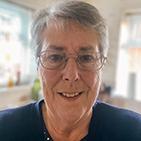
Sally Milsom
Hello, my name is Sally Milsom, and I am 70 years of age.
My APS symptoms began when I was around 16 years old – although we didn’t know at that time what APS was – with a 42-day menstrual cycle, severe migraines that often required hospitalisation, and inexplicable fatigue. With the support of my family, I underwent a variety of tests and tried different pain relief, but no specific diagnosis was ever made.
Following marriage and while trying to start a family, I persevered month by month through the migraines, losing days from work frequently and continuing to be hospitalised when they became too severe. My menstrual cycle remained around 42 days, with each period lasting about a week. My mother and sisters thought I would always be “the odd one out” – which we laugh about now!
At age 23, I was admitted to hospital with severe abdominal pain, and it was discovered that I had a ruptured ovary. A year later, following an easy pregnancy, I gave birth to my wonderful daughter (now aged 46).
For the next few years, things continued much the same, with migraines and heavy periods, until November 1982, when my gynaecologist diagnosed severe endometriosis and pelvic adhesions. I underwent a total hysterectomy and oophorectomy (removal of the second ovary). I was so relieved to have been fortunate enough to have had one successful pregnancy – unlike so many others I’ve read about.
Sadly, the migraines continued, and despite numerous attempts to find a diagnosis, nothing was identified – until 2005, when I was 50 years old. Tests were finally carried out for APS and, at long last, a diagnosis was made: “Lupus Anticoagulant Antiphospholipid Syndrome”.
And then the real journey began, as it does for all of us – regular testing, monitoring, medication, and so on. But from that point onwards, I haven’t had a single migraine or headache – not one! That, in itself, was the greatest gift for me and my family. No more hospitalisations, no more lost work hours – life became different and so much easier to manage.
Today, at 70, I have been advised to maintain my INR between 3.0 and 3.5, taking warfarin and having it monitored via my GP. I was advised to stop using my CoaguChek machine as it no longer calibrated correctly with lab results. So now I’m back to weekly monitoring (which isn’t always as simple as it sounds, given how difficult it can be to get appointments at the surgery), but onwards and upwards, eh?
Over the years, my medical history has also included tests for Guillain–Barré Syndrome (GBS), hypothyroidism (including a left-sided thyroidectomy), and a heart attack, after which I had two stents inserted. My current difficulties include hypertension, which requires three medications, and more recently my kidney function has deteriorated from Stage 3 to Stage 4 chronic kidney disease.
Information for us “oldies” with APS seems to be quite limited, so I’ve no idea how things will change or develop as I age. After 20 years of daily warfarin, time will tell, I suppose!
I hope some of my story helps others of my age group when they read this.
Thank you.
Emily Black

Emily Black - For Baby Loss Awareness Week
In December 2019, my husband and I were referred to a gynaecologist as we were struggling to conceive. In March 2020, I had surgery to drain some large ovarian cysts. It was then that we were told we would have to go through IVF because my fallopian tubes were completely blocked, meaning there was no possibility of conceiving naturally. I was also advised that I had a very low egg reserve.
That 20-minute surgery ended up taking five hours because I had so much scar tissue inside me from when my appendix burst at the age of six or seven. The surgeons couldn’t access the ovaries properly, and each time I had surgery after that, the scar tissue returned.
Since that operation, we’ve been through five rounds of IVF — three miscarriages and two failed rounds. The miscarriages all happened at six weeks and were some of the most painful experiences I’ve ever had. I remember being curled up in a ball on the kitchen floor, in unbearable pain.
I went on to have another three surgeries, one of which was to remove my fallopian tubes. We had endless tests, blood work, and hospital visits. During the last round of IVF, I collapsed and ended up in hospital — after hundreds of injections, tablets, and hormones being pumped into me.
Eventually, I was referred to the recurrent miscarriage clinic at the hospital for further testing. I tried to stay positive, hoping we would finally get some answers as to why I had experienced three miscarriages. The tests revealed that I have antiphospholipid syndrome (APS), which I later learned can be linked to recurrent miscarriages.
After my diagnosis, I looked back on the time I collapsed during an IVF injection, when I couldn’t feel half my face, and I wondered whether that could have been a stroke, as I know this can be a symptom of APS. When I mentioned it to the nurses at the time, they didn’t think much of it. I later had a brain scan after being diagnosed with APS, and thankfully, it showed no problems.
When we tried IVF again, we were told that it was simply a case of “keep trying” and that the next step could be to use blood-thinning injections. At that point, we felt defeated. How much more could we take? The setbacks and uncertainty were emotionally and physically draining. The pain and grief of the miscarriages were absolutely heartbreaking. Looking at baby clothes but not being able to buy them; wondering what our baby would look like, yet still feeling so far from that dream — it was devastating. Seeing others announce their pregnancies on social media was painful, and we felt like our happily ever after was still out of reach.
Now, when I have painful legs, tingling, or pins and needles, I can’t help but worry that it might be a blood clot caused by APS. It’s always in the back of my mind.
While we’re still coming to terms with the fact that we may not be able to have our own biological child, we’ve started exploring other paths, and we are now on a new journey, in the process of adopting a child.
Louisa
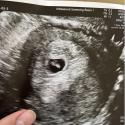
Louisa - For Baby Loss Awareness Week
It’s not an easy story to tell, and the story is still being written, but I want people to know — you are not alone on this journey. I often do feel alone, because I don’t know anyone who has lost as many babies as I have. I am also a midwife, so even then, for the women and families I’ve cared for within my own caseload, I have still not seen someone with my history. I feel lonely in that sense because no one knows what this feels like … but I am not alone! Thousands of us are losing baby after baby. Wanted pregnancy after wanted pregnancy.
A brief summary of my journey: I have experienced seven pregnancy losses: six miscarriages at differing gestations within the first trimester and under varying circumstances (anembryonic, early embryonic demise after a heartbeat, missed miscarriage). One pregnancy was ectopic, resulting in a salpingectomy. I have had to undergo five surgeries now: three ERPCs, one salpingectomy and one hysteroscopy, all under general anaesthetic, in the space of two and a half years.
My hands guide life into the world while my soul aches for a child of my own and grieves the ones I have lost.
Amongst all of the losses, a wonderful team have seen me under the recurrent miscarriage clinic. They discovered I have APS, which would go some way to explain my losses. I have tried the standard protocol (aspirin and enoxaparin) twice now and have not yet been successful. I know my second loss on the protocol was due to a genetic cause, but what about the others? I have had other pregnancies genetically screened that have been normal. What caused those? This horrible clotting problem? My own body rejecting what my heart wants?
In the midst of my grief, I cry, why me? At a time when my friends are having their first and second babies, I internally scream, what did I do to deserve this? I look at people with their newborns, and I disassociate because I wouldn’t be able to do my job otherwise. So, I wander the halls of Labour Ward, and I feel utterly alone. “Will I ever be a mummy?” fills my Google search history. I go to my best friend’s baby shower, knowing I’ve chosen a date for my own seven times and never made it there.
I can’t read any more books; I will truly self-combust. My story is still being written, and I hope I make it. I hope one baby is in the right place at the right time, and that my medications are started at the right time. I know everyone with APS is likely having this journey, but to remind you, you are not alone.
I pray for us all: to the mother-to-be reading this now, who I hope feels slightly less alone within the community. APS Support UK has been fantastic. At a time when I needed evidence to fight for different medications, they supported me with just what I needed. They are there for us — for anything we need — to guide us and so we feel just slightly less alone.
Our babies will come to us.
Mhairi Hayes
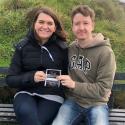
Mhairi Hayes - For Baby Loss Awareness Week
I lost my daughter, Niamh, in January 2020 at 27 weeks’ gestation. I had spent weeks feeling incredibly unwell, with a wide range of symptoms and reduced movements. I had been in touch with my midwife a few times and visited my GP, but they failed to realise that my symptoms were due to HELLP syndrome. I had upper gastric pain, insomnia, nausea, indigestion, swollen hands, feet and face, severe back and neck pain — I was absolutely exhausted.
After about three weeks of being unable to do much except lie on the couch, I developed a spot in my eye. My husband decided it was time to go to hospital. There, we found out our beloved Niamh had passed away. Everything suddenly became very urgent, and I wasn’t well enough to fully understand what was happening. I was immediately started on a rapid induction, and Niamh was delivered the next day, on the 16th of January at 13:01, weighing 1lb 5oz. She was absolutely perfect — just beautiful. We spent four precious days in hospital with her, making memories. I spent a few weeks on blood pressure medication, but my blood pressure returned to normal relatively quickly.
In the weeks and months that followed, we went into lockdown, so the answers we so desperately needed were slow to arrive. We had an idea that Niamh was smaller than she should have been and had been growth-restricted. We knew the placenta probably hadn’t been quite right, but we didn’t know why.
Somewhere in those dark months, I decided my reason to carry on was to give our embryos a chance at life. We had used IVF to conceive Niamh and had three frozen embryos left. This took time to arrange, as the clinics were closed. Just as they reopened and we were about to start a cycle, my obstetrician called.
The blood tests I had after Niamh was born showed I had antiphospholipid antibodies in my blood, and they wanted to re-test to see if that was still the case. They didn’t think it would be — they said it can happen in pregnancy and disappear. It had been six months since Niamh was born, so they tested again. Of course, those tests came back positive. We finally had a very specific explanation for why Niamh had died, why I had developed HELLP syndrome so severely and so early in my pregnancy — and, most importantly, we had medications I could take in any future pregnancy to give us hope that it might not happen again.
My haematologist worked closely with the IVF clinic. They advised that I didn’t need medication on a day-to-day basis, only during pregnancy or if I were to undergo an operation.
To our complete shock and disbelief, I fell pregnant again on our next embryo transfer. It was a terrifying pregnancy, and looking back, I have absolutely no idea how we made it through. Our midwife team and obstetrician kept a close eye on us both. I was prescribed aspirin and blood thinners and was induced at 37 weeks. Our beautiful son, Jack, was born healthy and well, 8lb 4oz, despite his early induction. I had no symptoms of HELLP syndrome before or after his birth. The medication worked for us.
I still have a lot of questions about my diagnosis and the choices I can make in life going forward, but I currently have no access to a haematologist. My GP does not know enough to accurately answer my questions — so much awareness still needs to be raised. The idea of trying for another pregnancy and risking my life and health is too terrifying.
Jack fulfilled the ache and longing we so desperately had for a living child. We are so grateful to have him — he has brought us so much love — but he could never be a replacement. Our family will never be complete; Niamh will always be missing from our family photos. She is, however, thought of with love and joy every single day. She gave me so many beautiful experiences during my first, much-longed-for pregnancy, and those are the memories I hold most dear.
Sonia Bhamra

Sonia Bhamra
I remember when I first started displaying symptoms of my condition. We had just celebrated my birthday at the Yorkshire Wildlife Park and I began to feel unwell the following day. At work, I struggled to hold my mouse, felt extremely tired, and noticed my arm trembling. I thought I had just slept awkwardly and tried to push through, especially as I had just started a new job.
That night was excruciating. My arm was burning, tight, and covered in pins and needles. I couldn’t sleep. Even simple tasks like walking left me breathless, and I couldn’t hold a hairdryer for more than a few seconds without exhaustion.
I called NHS 111 and was sent to A&E. A GP briefly examined me, saw the swelling and tremors, but diagnosed superficial phlebitis. I was sent home with antibiotics and ibuprofen. My family were worried, but I reassured them.
The following day, my brother urged me to attend another hospital. That night my pain became unbearable, so the next morning I followed his advice. This time I was seen immediately. An ultrasound revealed an extensive clot in my right arm. I was given heparin and told that untreated for days, the clot could have travelled to my lungs and caused a pulmonary embolism.
Things moved quickly. I saw a vascular surgeon who diagnosed an upper limb DVT, which is rare. They suspected thoracic outlet syndrome, so I had an x-ray and more tests, but no extra rib was found. My case was referred to the MDT meeting, and I was offered clot-busting therapy. This carried risks, including bleeding in the brain or gut. With little time to decide, my partner and I researched and eventually agreed to follow my consultant’s advice.
However, on the day of admission, my consultant noted my improvement and suggested waiting for the MDT’s decision. That night, waiting for a bed, I had a sinking feeling. I was terrified about surgery. My family called with their advice, and after much debate I decided to leave. I felt uncertain but later learned it was the best choice for me. A surgeon later admitted that while the surgery is common, “when it goes wrong, it really goes wrong.”
From there, I went from heparin injections to apixaban, then warfarin. Apixaban gave me brain fog and I later learned it was unsuitable for APS, as it only targets veins, while APS can cause clots in arteries.
I’ve made lifestyle changes, keep my arm elevated, and monitor my diet to keep my INR stable. My APS diagnosis was a huge adjustment, both physically and mentally. I still experience fatigue, brain fog, balance issues, forgetfulness, and aches. Some days I can push through, others I need to rest.
Despite this, I’ve regained much of what I lost. My partner has been a constant support, even running to raise awareness for APS and fundraising for the charity, which inspired me to keep going. I don’t know how the disease will progress, but I’m grateful for the good days and determined to keep rebuilding my life.
Eloise Hardy

Eloise Hardy
My name is Eloise, I’m 32, and I have APS (Antiphospholipid Syndrome).
I had my first blood clot in my arm back in 2021 when I was 7 weeks pregnant. At the time, the clot was put down to pregnancy, and no further investigation was done.
Fast forward to June 2023, I developed a pain in my leg that caused me to limp, and I was diagnosed with a DVT in my calf. A month later, in July 2023, further testing revealed that I have Factor V Leiden — a genetic clotting disorder.
Two months after the DVT, I found out I was pregnant again, but sadly I lost my baby at 10 weeks. This heartbreaking loss led to more thorough testing, and I eventually tested positive twice for lupus anticoagulant, 12 weeks apart — leading to my official diagnosis of APS in April 2024.
I had never heard of APS before, but once I started reading about it, so many things began to make sense — especially the unexplained fatigue I’ve dealt with for years. Despite getting good sleep, I would often feel exhausted for no clear reason.
Since my diagnosis, I’ve become much more aware of every ache or pain in my body — and it’s the constant worry and anxiety that I find the hardest part of living with APS.
I really want to do everything I can to help raise awareness of this condition. I’m incredibly grateful for the knowledge and information shared by APS Support UK — I’ve learned so much through their website and it’s helped me feel less alone on this journey.
Sal Holesworth
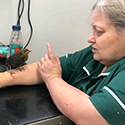
Sal Holesworth
My story starts in February 2024. I had a busy day at work and wasn’t feeling too well. I’d had an upset stomach for most of the day and by home time was feeling pretty rough. My lift home arrived and I went home thinking I had just picked up a 24-hour bug that was doing the rounds, even smiling when somebody cheerily added that I looked greener than my uniform.
The next morning, I rang in sick after being up all night with vomiting and diarrhoea. Thankfully, the diarrhoea had stopped in the early hours, so I thought I was over the worst and just dealing with the sickness now. I assumed that as long as I kept hydrated, I’d soon be back to normal — but I couldn’t have been more wrong.
By the early hours of the next morning, I was in resus with the worst pain I have ever felt. I’d gone from a suspected stomach bug to, according to my medical notes, “poor prognosis next of kin informed.” I vaguely remember being told I had a clot that was affecting the blood supply to my liver and part of my intestines, and that I was very ill.
I was hospitalised for just over three weeks and went home with injections to keep me going. I was told to get more from my GP and to not run out. I was referred to haematology and advised that I would eventually go onto tablets for anticoagulation, likely for life. There is a family history of Factor V Leiden, but I was later found not to have this.
Over the next two months, I was still having problems with diarrhoea and vomiting — though not as severe. I wasn’t on any medication to help manage the symptoms. Bloods were taken to try to establish the cause of the clot, I lost nearly four stone in weight, and I had three overnight admissions, which were pretty much dismissed as ‘anxiety’. This ‘anxiety’ eventually led to emergency surgery and bowel resection due to adhesions, and another two weeks in hospital.
In August, I was diagnosed with antiphospholipid syndrome (APS). I knew very little about it — but it felt like I was having to learn more than my GP knew at the time. I found APS Support UK through an internet search and set out to educate myself. At the same time, I found Thrombosis UK. I was desperate to understand what had just happened to me and how I could do everything possible to prevent it from happening again.
That should have been the end of my story. I had my diagnosis, the information to help me manage the condition, and although I still had bowel and digestion issues, I was taking my medication as prescribed and starting to gain weight again. But alongside this, I was absolutely terrified of ever getting ill again and having to seek treatment — including at my GP practice — which was difficult because I was now on warfarin and needed regular INR checks.
With considerable help through Thrombosis UK, I managed the INR checks, though I was hardly ever in range (probably because of the digestive problems), and ended up using both warfarin and injections. I was referred to a specialist in London who kindly spoke to me on the phone first, until I was brave enough for a face-to-face visit. We agreed a date, and again Thrombosis UK supported me to ensure this could happen. So far, so good.
In October, before I had attended the London appointment, I started to bleed. Initially, I thought it was cystitis and tried to ignore it, hoping it would go away. It didn’t. It got worse, and I panicked for a day or so before eventually taking advice and going to A&E, which led to a whirlwind of appointments: gynae, CT, hysteroscopy, ultrasound, biopsy — all within two to three weeks. You can probably see where this is heading.
I kept my appointment in London, and I remember being told that if the bleed had flagged something serious, it had done me a favour. On 10 December 2024, at 4:15 pm, I was told I had endometrial cancer. I have since had the surgery in January and the radiotherapy in March, and as far as I’m concerned, that issue has been dealt with. However, the anaesthetist advised an urgent cardiology appointment following surgery due to significant breathlessness.
By April, the breathlessness had worsened considerably. I rang 111 for advice, ended up back in A&E where my symptoms were initially dismissed, but I was then referred to SDEC where they found a pulmonary embolism. My anticoagulant was changed, and I was put back on warfarin while awaiting an echocardiogram.
So that’s my story. I have a few appointments to go — one for cardiology, one for gastroenterology, and a phone call — but the finish line now feels in sight.
Things have got better for me, though it’s taken a lot of help to get here. I’m not exactly happy attending appointments, but when push comes to shove, I can manage them most of the time now. They have got easier, and I’ve grown more confident. I’ve learned to recognise when things don’t feel right and that I need to take notice rather than trying to ignore them.
The reason for sharing my story? I have seen how urgently and seriously cancer is taken — and rightly so — but when you mention clots, the response is often very different. There’s far less support, far less funding, and patients are often left to navigate their condition alone. People take the time to explain cancer, the treatment, and the prognosis — but you just don’t get that with clots.
Conditions like antiphospholipid syndrome (APS) deserve the same level of awareness, support and understanding. Clots need better recognition. They’re not rare — many people will know someone affected — but symptoms are all too often dismissed as ‘anxiety’ and not properly investigated, sometimes with devastating consequences. Thrombosis can be just as life-changing as cancer. In my case, my cancer has been pretty much a non-event compared to the aftermath of the portal vein thrombosis.
Alexandria Walker

Alexandria Walker
My APS Journey – Finally, an Answer
In 2015/16, during my pregnancy with my youngest of three children, I began experiencing troubling heart palpitations. After some investigations, I was told I had a benign faulty mitral valve causing regurgitation — nothing to worry about, they said.
In 2018, just after turning 40, I fell pregnant again. At my 12-week, 5-day scan, I was told I’d had a silent miscarriage. I was absolutely devastated. I tried again, and in 2020, I became pregnant once more. In June, at just under 10 weeks, I experienced another silent miscarriage. This time, I somehow felt more in tune with what was happening.
Because I was now 42, the hospital agreed to investigate. After two positive tests for lupus anticoagulant, I was told I had “sticky blood” — a non-medical term sometimes used by doctors to describe blood clotting disorders, including APS — possibly the reason behind my miscarriages. Although grateful to have some explanation, I decided not to try again, as I was advised that any future pregnancy would likely involve treatment with aspirin and anticoagulants.
Meanwhile, my heart palpitations worsened. I was fit and healthy — a non-smoker, non-drinker, exercising five times a week — yet something didn’t feel right. I couldn’t help but wonder if this “sticky blood” was linked to more than just the miscarriages.
I began to ask more questions and to document my symptoms, which kept adding up: the miscarriages, heart palpitations, faulty valve, tinnitus, Raynaud’s, migraines, blurry vision — even a strange episode where, after a cold water dip, one side of my face temporarily dropped. That one really concerned me.
Eventually, I found APS support and quickly realised I had far too many symptoms for it to be a coincidence. I was referred to haematology in March 2024. After a third positive lupus anticoagulant test, and in light of my growing list of symptoms, I finally received a formal diagnosis of Antiphospholipid Syndrome (APS) in May 2025.
I’m now awaiting a referral to rheumatology, where they’ll help manage my symptoms and explore the possibility of a connection to Systemic Lupus Erythematosus (SLE).
While this diagnosis has taken nearly a decade to reach, I feel a strange sense of peace now that I finally have an answer. This hasn’t been an easy road, but I’ve never stopped listening to my body — and I won’t let this diagnosis stand in my way.
Laura Barrowclough
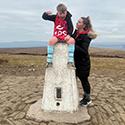
Laura Barrowclough
I have recently been diagnosed with APS, and it’s been such a struggle to even get the diagnosis. Before my positive tests, I went through months and months of worry and countless other tests to figure out what was wrong with me — from MRIs for suspected brain tumours to tests for multiple sclerosis. I constantly experience pins and needles in my legs and feet, sometimes in my arms, and I also get flare-ups around my joints. It’s caused panic attacks, anxiety, and added stress on top of everyday life.
Despite undergoing hundreds of blood tests that kept coming back normal, I knew my body and I knew something wasn’t right. I wasn’t imagining it. So, I pieced together my whole health history like a jigsaw puzzle and asked my GP to test for APS after doing my own research. I had previously had five miscarriages and an ectopic pregnancy, and I remembered having one positive cardiolipin test over ten years ago. I asked for this test to be repeated.
At first, I was denied the test because, according to the doctors, you can’t request your own blood tests — and APS is considered rare. But after pushing for it and presenting my medical history (which they already had), I eventually got the test. The results came back positive four times, confirming my APS diagnosis.
Living with APS feels like being a ticking time bomb, especially after reading about the condition. My body is essentially attacking itself, and that’s terrifying. The doctors still aren’t sure why I have constant pins and needles and muscle twitches, as these aren’t typical symptoms of APS. They’ve referred me to a neurologist, but it’s scary not knowing what’s next. Despite this, I’m holding on to hope that I can live a healthy life and eventually receive the right treatment.
Because of this, I’ve decided to take action and raise awareness of APS. I’m challenging myself to climb Pendle Hill in Lancashire 100 times over the course of this year. This challenge will not only help with my health, but it will also raise vital funds for APS Support UK to support more research into this condition. I’ll be doing this with my rainbow boy, who is now nine.
Any support for the charity would be greatly appreciated — APS Support UK has given me such a huge insight into the world of APS. You can follow my journey and donate here.
Amber Goldie

Amber Goldie
Paul Jones-Goldie shares the story of his daughter Amber’s journey to an APS diagnosis:
Amber has always been very active, practicing gymnastics at a relatively high level before transitioning to kickboxing. However, she had always been prone to bouts of sickness and headaches.
These headaches would appear in clusters, lasting anywhere from a day to a week. At first, we were told it was normal for pre-teens to suffer from headaches, and since migraines run in the family, it could be hereditary.
After one particularly bad episode, we took her to an optician, thinking it might have something to do with her eyesight. He was very thorough, and after identifying pressure behind her eyes, he made an immediate referral to the hospital.
Amber underwent a lumbar puncture to relieve the pressure before having both a CT scan and an MRI. These tests identified a clot on her brain.
She was given rivaroxaban and remained in the hospital for 10 days before being released on oral blood thinners. At this time, her blood was tested for APS, but we later found out the results were inconclusive, and no further tests were ordered.
Approximately six months later, Amber started to complain of disturbances in her sight, including greying out and momentary loss. We took her back to the same optician, who again identified swelling on the optic nerve and sent her straight to the hospital. She was quite ill during her stay this time, and we feared that her eyesight might be permanently damaged.
Another MRI confirmed a further clot. It was then that she was diagnosed with APS, and our journey of learning and management began. Amber continues to lead a full and active lifestyle, moving into kickboxing coaching (as fighting wouldn't be advisable) to earn her black belt.
At 14, she is still quite young to fully understand the limitations that being on warfarin for the rest of her life imposes on her and the potential for further health complications.
Our hope is that future research will identify a method of controlling APS without resorting to blood thinners.
Julia Hurrell

Julia Hurrell
I was 16 and I was just sitting my GCSEs. I started feeling like my leg was swelling and getting cold. I managed to stumble home, and by that time my leg was purple. I was taken straight to the hospital and was told I had a blood clot the size of a tennis ball in my groin. Being 16, this was very scary and upsetting, putting me into a depressive state. I was tested two weeks later and was found to be positive for lupus anticoagulant, I was diagnosed with APS. I didn’t know what this meant for me or my outlook on life.
I was put on warfarin and managed by INR blood tests. I was told I would be on this medication lifelong. When I was 20, I developed a second blood clot in my right leg behind my knee. This meant my INR range had to be increased, which helped prevent further blood clots.
Unfortunately, I have had four recurrent miscarriages due to my condition, but I do have a lovely little boy named Oliver, who is now 2.6 years old. He was born at 26+2 weeks due to preeclampsia, HELLP syndrome, and reduced platelets.
I’m now 34 and loving life with my family. My condition doesn’t bring me down anymore, and we try to create great memories. I have recently been diagnosed with lupus and rheumatoid arthritis, but I live each day as it comes.
I have my own house, my own family, and an amazingly supportive partner. This condition doesn’t control me; I control it!
Ria Thornhill

Ria Thornhill
I was diagnosed with antiphospholipid syndrome (APS) in January 2024 at the age of 23. The diagnosis came after I suffered from bilateral pulmonary embolisms in May 2023 and was put on apixaban. I have been living with immune thrombocytopenia purpura (ITP) for the past 7 years. ITP is a blood disorder that destroys platelets, making blood clotting difficult and causing a high risk of bleeding. So, the diagnosis of PE and APS came as a huge shock to me.
My haematologist sent off additional blood tests to determine the cause of my clots due to my ITP. After several weeks, I was informed that I was triple positive for antiphospholipid syndrome, and I have been prescribed lifelong warfarin treatment since then. This involves weekly INR blood prick tests to ensure that my blood is within the therapeutic range of 2-3. To say the least, it has been a challenging journey with its ups and downs!
In April 2023, I had a sudden seizure while I was at work in an anaesthetic room. After that, I had to spend 10 days in the hospital undergoing various tests such as CT/MRI, blood tests and a lumbar puncture. The doctors initially suspected that there was an abnormality in my brain that caused the seizure, but subsequent scans have ruled out that possibility.
Instead, they discovered a thickening on my skull, which they believe may be related to APS. However, they are still uncertain if the seizure was also caused by APS, as I was only diagnosed with my PEs two weeks later. I am currently seeing both an NHS and a private neurologist to determine whether I should continue taking levetiracetam to prevent further seizures related to APS.
I had never heard of APS before so when I was diagnosed with it, I thought that I was only on blood thinners to prevent any clotting events. However, I started experiencing random symptoms such as frequent headaches, brain fog, extreme fatigue, tingling, and pain down my arms, hands, and feet. Upon researching, I came across APS Support UK, which informed me that these were all symptoms of APS. Although these symptoms weren't always consistent, I began to think that there might be another underlying issue. As a registered medical professional, I like to know the why and how of everything that has to do with the body. The more I know, the more reassured I feel.
It's difficult to come to terms with having a condition in your body that is unlikely to be cured. However, I am grateful for the amazing support of my family, friends, and haematologist who have been with me every step of the way. My haematologist and haematology nurses have become like an extended part of my family. They always prioritise what is best for me while also allowing me to make decisions for myself. They answer all my questions during appointments or via phone. They even make my life easier by booking a blood test appointment for me when I'm unable to access it myself. Having such supportive health professionals has made my journey much easier. Without their prompt decisions, I might not have been here to share my story.
This diagnosis has been a shock not only for me, but also for my family. It's difficult to comprehend that ITP and APS, two opposite blood disorders, are linked together and getting a balance of both is challenging. The diagnosis came after suffering from bilateral pulmonary embolisms. However, I am grateful that I received a quick diagnosis to prevent further catastrophic clotting events. This enables me to prepare for further milestones in life, such as starting a family, with the correct medical knowledge and treatment.
After being diagnosed with both APS and ITP, I created an Instagram account with the username @autoimmunedisorderandri to share my journey with these disorders. I use this platform to document my treatments, side effects, and symptoms and connect with others who are going through the same. It's still hard for me to comprehend that I have two opposite yet connected blood disorders. I haven't encountered anyone who has both, but I hope that more people can receive the correct diagnosis and treatment by spreading awareness.
I am grateful for pages and charities such as APS Support UK that provide comprehensive information about APS and share stories of patients who have overcome similar struggles. These resources reassure people that they are not alone and that there are others going through the same thing.
Love, Ria x
Kirsty Birney
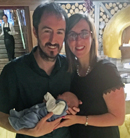
Kirsty Birney
In 2010, when I had my first miscarriage, I thought it was my fault. I was 25, just married and hadn't been eating the best, I was drinking most weekends and had a busy life, so I buried all my feelings of guilt and hurt, put on a smile and got on with life.
In December 2014, I fell pregnant again, and we were overjoyed. But, unfortunately, our happiness turned to sorrow when on Boxing Day, at ten weeks pregnant, it was confirmed I had lost our baby. The hurt was unbearable and the guilt terrible. I felt I had let my husband down and was a failure and unworthy of being a mum.
Somehow we found the strength to try again and, in May 2015, we cautiously let ourselves be happy when we had another positive pregnancy test; however, at eight weeks pregnant, our baby was lost again.
At this point, my GP referred me for further investigations, and following blood results, I tested positive for antiphospholipid antibodies. Hence, the consultant put a plan in place for my next pregnancy. However, by now, I was so hurt from our losses we had decided we couldn't try again because I didn't think I had the strength to cope if we lost another baby; we’d decided we were happy just the two of us and our dog.
Then the unthinkable happened on 2nd January 2016: I discovered I was pregnant!!! Sheer panic set in; I couldn't lose this baby!
I started on my aspirin, and then at seven weeks pregnant, we had the best scan of our lives: our baby was doing well, and we saw his heart beating strongly! I started on my daily heparin injections and continued this until I was 32 weeks.
Unfortunately, at this point, I developed appendicitis and following surgery, our precious baby boy Conall John Birney was born weighing just 3lbs9oz - while he was small, he was perfect! After three weeks in a special care baby unit, our little boy was home with his mummy and daddy, and we can't remember life without him!
Conall has brought such joy and love to our lives, and he has also given me the strength of hope that miracles do happen!
He has also given me the strength to talk about my other babies, and while I still hurt that I never held them or got to tell them how much I love them, I smile when I think they are in heaven looking over all of us. Also, without them, I would never have had bloods done and discovered that I had antiphospholipid antibodies; therefore, Conall would not have been here.
Throughout my experience, I felt hopeless at times, everything seemed so negative, so it would be great if people reading my story could find some hope. It's a hard road but totally worth it!!!
Pamela Campbell
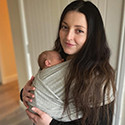
Pamela Campbell
My diagnosis of antiphospholipid syndrome came after suffering the heartbreak of recurrent pregnancy loss. I lost our first baby in November 2021, and this took a huge toll on my health and resulted in having to leave my job at the time to cope with the PTSD. I was assured this ‘one-off’ was ‘bad luck’ by the obstetrician, midwives, and GP and to ‘try again’ when we were ready. This was still the advice given after suffering a further two miscarriages, and I had to continually pursue my GP for a referral for investigation.
In my desperation waiting for a referral, I sought private blood testing for fertility health and consultations with gynaecologists, all of which came back clear and, again, put our losses down to bad luck. I was then referred to an amazing obstetrician who finally listened to me. I tested positive for lupus anticoagulant in her screening, and a treatment plan was put in place for any future pregnancies. I was to start on aspirin and then LMWH after an early scan. Devastatingly, I went on to have another three early miscarriages before advocating to incorporate other treatments (HCQ) and tweak the timing of my anticoagulants to start them well before a positive test.
Our seventh pregnancy was full of dread and fear, but thanks to the treatment and support of the incredible medical team, I was very closely monitored with scans every 1 or 2 weeks throughout. Despite all the anxiety and developing COVID and Tietze syndrome in the third trimester, my pregnancy progressed well, but it was difficult to enjoy even the positive moments. I pretty much avoided sharing or discussing my pregnancy up until the final weeks. We finally welcomed our rainbow baby Lara at 37 weeks via caesarean just before Christmas 2023. My husband and I couldn’t be more grateful for our precious girl. With thanks to my wonderful and compassionate consultant, as well as the support from an APS group on Facebook and countless others, we were somehow able to navigate the hopelessness and darkness over the past few years. There is light at the end of the tunnel.
Shelby Clifford
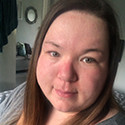
Shelby Clifford
My name is Shelby Clifford, I’m 29 years old, and I have APS.
A brief version of my story is that at the age of 20, I had a very large DVT and bilateral PEs and was very close to death, but I pulled through somehow. At the time, the doctors had no idea why, and afterwards, as I was taking warfarin, they didn’t want to stop the treatment to test for things, so I carried on with my life.
I could still live normally, work etc., but then, a few years later, I started getting horrendous pain, mostly in my feet and legs. It started spreading to my whole body. It got to the point where I was in agony all over, every day.
I tried working part-time to see if that would help, but it progressed to the point where I couldn’t remember the drive home, and I’d arrive home in tears. My mum would have to help me change into my pyjamas and then put me to bed. It took a little while of being like this before I gave in, and it was really hard for me. I felt like I had no use. I had to grieve for my old life.
Things continued deteriorating, and then I developed meningitis, which worsened things. I’m still unable to work, and I have carers as I'm unable to wash myself etc. Being so young, I thought there was no hope for the future, but I’m having weight loss surgery in a few weeks, and I’m hopeful it will give me some sort of life back. I know it’s not going to make my conditions go away. Still, it should help with my mobility, physical and mental health, and hopefully, more independence and maybe a chance at starting a family of my own.
The only reason I was tested for APS was because my Mum had breast cancer; they wanted her to take some medication that has a risk of causing clots. As I already had a history of clotting, she was worried, so they said they’d do some tests to see if she was at risk of thrombosis; her APS tests returned positive (she hasn’t had clots but suffered five miscarriages). So, they decided to test me for it, they didn’t take me off warfarin, but it still returned positive.
They also think my uncle (Mum's brother) and my Nan (Mum’s Mum) had it as my uncle died of a heart attack at age 51 and my Nan had a severe stroke. Strangely, my sister has had a PE but tested negative for APS. I also have three brothers; two didn’t want to be tested, and the other was negative.
My Mum and I have never had APS properly explained to us, and our GPs have no idea about it. We have read all the facts and information that APS Support UK share, which has been very helpful. We realised we had other symptoms we never knew were probably caused by the APS, so I want to thank the charity for helping us through it all.
Thank you for taking the time to read my story.
Rachel Cooper

Rachel Cooper
My name is Rachel, and I, unfortunately, have experienced the devastation of baby loss and miscarriage twice. In the summer of this year, I was diagnosed with antiphospholipid syndrome, which, combined with having chronic histiocytic intervillositis, was deemed the cause of my miscarriages.
My most recent experience was while holidaying in Bulgaria in September this year. I was just under two months along and had only just discovered I was pregnant before I went away. On the third day of my holiday, I experienced cramping and felt generally unwell. Recognising it as symptoms of an intrauterine infection, which I had experienced before, I was taken to a hospital over an hour away, where a doctor told me my baby was dead. I was confused about how he could base this off an ultrasound, as I was too early for it to show yet. I struggled to get answers with no interpreter.
I was then taken to a room where I believed I was being given pain relief, only to wake up to the remnants of an abortion carried out without my consent. The days after, I was kept under observation as results showed I did have an intrauterine infection, only being discharged for my flight home. I was frightened, grieving and struggling to process what happened to me with nobody able to explain.
My first loss was in February this year when I again was admitted with labour-like cramping but also bleeding. My histology showed that APS had caused severe clotting in my placenta, causing it not to develop properly and subsequently causing an intrauterine infection, which developed into sepsis. The infection became too severe, causing my waters to break, resulting in the death of my baby girl Esme at 18+3 weeks. I then had to deal with the physical and emotional ordeal of having to give birth to my baby, who was no longer with us. I still think every day of the quiet, dark room I had to give birth in, surrounded by the sounds of life coming into the world all around me, knowing I’d never see my daughter take her first breath.
I left the hospital feeling broken, fragile, and aching from grief. I held in my hands a little white box filled with keepsakes to remember my daughter, to stand for all the memories I’ll never get to make. I walked out of a hospital where I saw parents taking their babies home and expectant mums rubbing their bellies excitedly as they went in. I stood there with empty arms, longing for my baby, praying none of those parents would experience what I did, but questioning, “Why us?”
My partner went home that day and hid every sign of hope we had planted in the house. The pram, the cot, the baby grows, and maternity clothes are all tucked away in the attic. Erasing all traces of our naivety that we would be welcoming our little girl home one day.
I didn’t get a maternity leave; we were a few weeks away. Yet I still had to have medical appointments after, still needed time off to sort funeral arrangements and more crucially, needed time off to grieve and seek emotional support for what happened.
You lose a lot when you lose a baby. Your identity, your trust in your body, your sense of belonging in the world. You lose hope, faith and optimism. I lost friendships as people drifted away or stopped talking to me like they used to. I stopped being called “funny, kind or smart” and instead became the strong one. “The strongest person they ever knew”. Most tragic is what they mean. I struggled with those breakdowns of communication in the early days and knew I needed to find support.
I went to my first support group two days after my loss, I got my first counselling appointment two weeks after. I threw myself down every avenue of support I could find to try and pull myself through the devastation baby loss causes. I was comforted to be surrounded by parents who knew and understood what we were going through. There were no platitudes, no “it’s one of those things”, “they’re in a better place” or “it wasn’t meant to be.” Instead, I was with people who knew what happened was, and is, awful and shouldn’t happen to anybody. That when you grieve a loved one, you are comforted by memories, while we are tormented by the ones we have.
On the 28th of February, we said goodbye to our daughter, a small white coffin decorated with yellow flowers. There were no eulogies, no prayers. Instead, we sat and wondered what memories we would have had? We’ll never know what her laugh will sound like, whether she had her dad’s eyes or her mom’s nose, whether she’d be as mischievous as her big brother. No, instead, we’ll mourn the life she should have had and always wonder what could have been.
I volunteer now as a parent speaker to try and help hospitals give better care to parents who go through the heartbreak of baby loss. I hope I can try to spend my life doing anything I can to help prevent baby loss or at least give better support when it happens. I want to give my babies a legacy, as they are and always will be with me.
Garry Hellings

Garry Hellings
My name is Garry Hellings. I live in Langport, Somerset and I am 60 years old. Here is my APS story.
On the 3rd February 2007, I was aged 45 when I had a stroke mid-flight from Exeter to Belfast whilst on a regular business trip to one of my NHS hospital clients.
I awoke and didn't have a clue where I was; I just remember seeing the back of a man's head in the seat in front of me. The next thing was an airport fireman getting me out of the aircraft and being rather unwell on the way down the fuselage!
I was blue lighted by ambulance to Belfast City Hospital; I had an ECG, and they found nothing wrong. I remember feeling so very cold. I was told to get a taxi to the Holiday Inn I had booked for a couple of days. The hospital called me often throughout the day and night to check how I was, as there were no beds available.
I remember waking up at 5 am to get up and ready to make my way to the airport to return home. I got out of bed and my left side had become very weak; being in the mobility equipment industry, I knew instantly that I'd had a stroke and what a shocking feeling that was.
In 1999, I was returning from a work exhibition in Chicago, and again I blacked out during the flight. I was with my wife; I awoke to feel very unwell and confused. It took a few weeks for me to get well.
In 2002, I had tremendous chest pain and was prescribed amoxicillin, to which I suffered an allergic reaction. I had a trip to the hospital and was sent back home. Later that night, I began swelling up and was blue lighted back to A&E, where I was admitted. I suffered an anaphylactic shock and had to be resuscitated twice that night. My wife was called and told to get in to see me right away as I was in a critical state. This was quite a shock as she was told earlier that I was in the right place and to go home and get some rest and telephone after breakfast for my progress.
So, these were the tell-tell signs of my APS. I also suffered migraines from about age 14 to 30, and then they just stopped.
I was misdiagnosed for 11 months until I met a haematologist who said he believed he knew what was wrong, but he’d never met a man with it before. He was spot on, and I was referred to St Thomas’ Hospital London and met Professor Beverley Hunt. I was then put on warfarin and hydroxychloroquine.
I returned to my job in August 2008, but I couldn't cope with the stress of flying and driving. I was just so fatigued. I resigned and walked away from a good job. In September 2008, I started up my own specialist prescription mobility company, which I started with nothing. I did well, made a really good small business, and became vetted, approved, and audited by Trading standards. In February 2020, I was approached to sell my business which I accepted and finished training and handing over in October 2021. I retired at age 60.
I wanted to share my story to show others that we can, and do, get through life in our own ways with APS.
Caroline Jackson
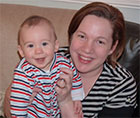
Caroline Jackson
I had two early miscarriages in 2008 after trying for a baby for over a year. One was in May and one in September at around seven weeks. I was under the care of fertility doctors, as I had also been diagnosed with polycystic ovaries. I had been on fertility drugs during the time I had the miscarriages and continued to take them afterwards to aid my fertility.
Unfortunately, one year later and I had had no further pregnancies. I know it is an awful thing to say, but I was desperate to get pregnant again so I would lose the baby and then I could get referred for more tests, but I was also terrified of being pregnant again in case I lost it. If that makes any sense?
When they told me I had miscarried, the doctors I saw in the early pregnancy unit said they could not refer me for further tests until I had had three consecutive miscarriages. They explained that the miscarriages I had were ‘just one of those things’ and that I had just as much chance as anybody else of having a normal pregnancy afterwards.
This made me feel very frustrated, as my husband and I felt so alone and helpless. Friends and family around us were getting pregnant easily and were having healthy babies, but we seemed unable to. Only very close family knew of our predicament, and I was very glad we had not told anyone else of the pregnancies, as telling my Mum and Dad I had lost them was one of the hardest things I have had to do.
When I saw my fertility doctor, he arranged for me to have some blood tests and booked me in for ovarian drilling to boost my fertility. The first blood test results came back saying I might have APS, but the test needed to be repeated in six weeks. I had the ovarian drilling operation in October 2009 and, in November 2009, was diagnosed with APS following the second positive blood test.
I found out I was pregnant in December 2009 and immediately started on daily heparin injections, HCG injections (twice a week), taking baby aspirin daily and had to wear thigh high compression stockings (these were great over the winter, but not during the summer!).
I think I spent the first four months utterly panicked that I would lose the baby. Even after the scans, when they could show me the baby’s strong heartbeat and told me all was progressing well, I was waiting for it to all go wrong. I used to be terrified to go for the scan: I thought they would say, “I am sorry, Mrs Jackson, there is no heartbeat”, as they did when I had the scan after I miscarried. Our close family did not want to get too excited; no one dared. We decided not to find out whether we were having a boy or a girl, that way we would not get too attached if something went wrong.
The doctors told me that although I was over the worst part of the pregnancy (the first three months), I ‘was not out of the woods yet’ as there was a risk of developing a blood clot and the baby’s growth could be affected. The pregnancy was monitored closely, and I was scanned every four weeks. Once I hit four months, we decided to tell everyone, as I was starting to show, that's if they had not already guessed. I had no problems at all during the pregnancy. My blood pressure was very stable.
It was a huge relief to everyone when Hayden was born on Friday 13th of August, 2010 (a lucky day for us!). I continued with the heparin injections and wearing the compression stockings for six weeks after his birth. I am now on no medication whatsoever and loving every minute of motherhood. It took us a long time to get our son, but he was so worth the wait.
Last year, we also added to our family when our healthy baby girl, Cerys, was born on 3rd April 2013. As soon as I found out I was pregnant, I started the heparin injections again. The pregnancy went really well, although she decided to put in an earlier appearance and arrived five weeks early. Apart from a six-day hospital stay, mainly because Cerys needed phototherapy treatment for jaundice, she was very healthy. Our family is now complete, thanks to the daily heparin injections.
Rosie Kamara
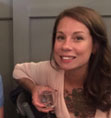
Rosie Kamara
When I was eight years old, I suffered from excessive joint pain, which was regularly put down to growing pains. However, I was eventually diagnosed with arthritis around the age of ten.
Between the ages of 12 to 13, I started having regular nose bleeds that became more and more aggressive. I was hospitalised when I had a 14-hour nose bleed that almost killed me because my platelet count had dropped down to just one (the average platelet count should be between 150-250).
This led to me being diagnosed with ITP - idiopathic thrombocytopenic purpura at the age of 14.
Due to the antibodies fighting away my platelet, I was then diagnosed with lupus. My first haematologist (who wasn’t that good) suggested he wanted to remove my spleen and informed me that I would never have children.
Said haematologist put me on a steroid medication when I was around 18 to encourage my platelet count to increase and, from the ages of 14-18, I was hospitalised regularly. My family told me I had a platelet transfusion, but I can't remember this.
When I was 19, I was at home alone in the shower when I suffered a stroke. I lost the ability to talk and fell in and out of euphoria and terror whilst the stroke took hold over the course of two hours.
I didn’t know what was happening, but the stroke was confirmed two weeks later with an MRI Scan, and I was put on aspirin immediately.
In the following two months, I was referred to a new rheumatologist (for the arthritis), and he thought I was suffering from a condition called APS – something that I had never heard of. He gave me a leaflet, and many of the symptoms seemed to fit, but it was confusing as I had been told that I had suffered from lupus for years.
After taking aspirin for a while, the haematologist decided to try me with warfarin. Whilst taking this, I hadn’t become ‘therapeutic’ and then discovered I was pregnant.
I was instantly referred to a new specialised haematologist to deal with the APS and pregnancy hand-in-hand. I was put on 60mg of heparin (Clexane) injections twice daily that I administered myself. The pregnancy was natural and successful, though terrifying throughout. My beautiful daughter is now six years old.
After having my daughter, my new haematologist decided to give warfarin another shot. Still, unfortunately, my body didn’t respond to the drug, so I was swiftly put back onto daily heparin injections.
After three years, when rivaroxaban was launched, I encouraged my haematologist to let me try this medication. He agreed, even though he didn’t like the idea, as it is not tested like warfarin and also doesn’t have an antidote, although this is being worked on.
Within a month and a half of taking it, I was put back onto heparin injections for the third time as I wasn’t getting enough blood flow to my brain, and the effect it had on my memory was terrible and dangerous. I’d regularly forget where I was or how to get somewhere – e.g. to my daughter’s nursery to collect her.
I tried warfarin (alongside the heparin) again in January 2017, and finally became therapeutic after four months of numerous blood tests a week and extensive monitoring.
After becoming therapeutic, I stopped injecting the heparin and continued just with the warfarin. However, within two weeks, I was back in a ‘danger zone’ and had to restart the heparin.
I am now 27 and still taking heparin injections daily, but I have noticed new symptoms have started in the last year.
Kerry Kilsby
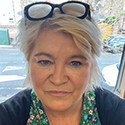
Kerry Kilsby
I hadn’t felt well for two years, but as I work as an administrator for the NHS, I think we tend to try to play down illness generally, as we know first-hand how overstretched the system is!
I was sent to so many different departments over two years, but nothing seemed to come together to make it possible to form a diagnosis. My GP had run tests for lupus and APS four times over those two years, which had all come back positive, but they thought (and I have it in writing!) that the Rheumatology consultant would pick them up, so they didn’t take things any further.
Fast forward to July 22nd 2021, when my sister had been diagnosed with lupus, and we had the same symptoms, including our past medical history of migraines and miscarriages. It was the first time I had looked at the symptoms and finally related to them, rather than thinking that at 53 years old, age wasn’t on my side!
I decided to have a telephone consultation with my GP, who wasn’t happy that I should be tested again just because my sister had it. It was never mentioned that I had tested positive four times before.
On the 23rd July, I finished my shift, dashed to my GP surgery to pick up the blood form, and then went to the blood clinic. I got home at about 4.30 pm and felt a little off but put it all down to working (the pandemic was a killer on the work front! I was sweating, but then it was July…and then I felt sick…did I really need to rush that sandwich at lunch?!).
Then a few hours later, I was in A&E, having been blue-lighted in an ambulance with a heart attack (thanks to my amazing daughter for spotting the symptoms and calling the ambulance). I then had three stents put in; there was a lot of talk about ‘lupus’, ‘lupus’, ‘lupus’. I came home and then went for a check-up one week later, feeling absolutely dreadful. They did an ECG, and within an hour, I was back in an ambulance to St Thomas’ Hospital to have three further stents and 16 balloons inserted as my main artery had collapsed.
It’s been a difficult journey and rather soul-destroying that I feel so let down by my GP. Only now, having had such an amazing Cardiologist at Kingston hospital, am I finally getting the treatment I should have received two years ago. To now hear an aspirin could have stopped my heart attack and could have been given as a precaution really upsets me.
Each day is a battle. I am half the person I was before, but that other half is fighting so hard to go back to being the wife, mother and ‘nana’ I was before, in between extreme bouts of fatigue. The only thing I have found that saved my mental health was returning to work, even on reduced hours. Hearing about other people's struggles with being ill takes my mind off me. Now I am shouting from the rooftops about lupus and APS and how a simple blood test can save your life, and shockingly it’s not offered as standard even when the symptoms all add up.
Keith Lewis
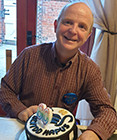
Keith Lewis
In April 2007, at the age of 45, I suffered a ‘minor stroke’. This was out of the blue as I was very fit and very busy, running a Welsh clog dance group, looking after three children (the fourth and eldest was working in France), making musical instruments, playing the harp, Welsh bagpipes and other instruments.
I never smoked and didn’t drink much alcohol, so a stroke was the last thing I expected. I had started having migraines in 2000 and had always suffered from mild headaches that could last for days and sharp headaches that came and went in seconds. The doctor suggested it was “in the family” as my father and two of his three brothers had suffered strokes. I was started on aspirin and a statin and sent on my way.
The stroke has left me with weakness in my left arm and leg, word-finding difficulties, no energy, and I couldn’t tell the time unless on a digital clock. As an Occupational Therapist with experience working with stroke survivors, I set myself a treatment plan.
After six months, I could walk on the flat without limping and was almost back to the level of playing the harp as before the stroke. I still had word-finding difficulties which would always hit at the most inconvenient times, and some memory problems. I was able to return to work but needed to write important information down to make sure that I acted upon them.
Then in 2010, I had an ‘acute confusional state’. I can remember the start of the day, but then nothing until waking up in hospital with my brother, eldest daughter and son around me. The next few days were patchy, although I was sent home again.
My son and his future wife stayed with me for the following week to keep an eye on me. My medication was changed from aspirin to clopidogrel. I was still getting migraines, some of them being hemiplegic migraines that looked as if I was having a stroke, but they passed with rest and darkness.
In 2015, I collapsed at work and was rushed to the local A&E department with what turned out to be another hemiplegic migraine. The doctor there advised that if I felt a migraine coming on and if there was a progression of headache, then pins and needles, and then weakness, it was likely to be a hemiplegic migraine and to take three aspirin tablets. This was the best advice I had received, as for the next few years, I was able to manage the migraines.
However, this collapse led me to decide to retire from the NHS as soon as I could. So, in 2016, at the age of 55, I took a significant reduction of my pension and retired.
I now work part-time in the local supermarket in the bakery section (apart from returning to the NHS for three months to help with the initial pandemic provision).
During this time, I noticed my legs were always cold. After visiting the GP, a locum ordered some blood tests. When they came back, my GP didn’t know what they meant. She referred me to a rheumatologist, who told me I had APS. He didn’t have any information to give me other than about the hydroxychloroquine, which he prescribed.
I was left to look up the information for myself, which explained so much, like why I had had the initial stroke, had so many headaches, and was so tired all the time. I also noted that there was a familial tendency. So, I asked my sister, brother, three daughters, and son to get tested. My son, as a result, was also diagnosed as having APS, my brother didn’t get tested, and the girls, including my sister, didn’t have it.
I’ve concluded that as my father and two of his brothers died of a stroke and that both my son and I have it, it probably runs on the male side in my family. I’m also glad that thanks to campaigning by APS Support UK, people having strokes at a young age are now screened for APS. This will help so many who won’t have to have a 13-year wait to have a diagnosis to make sense of what is going on.
I’ve been on the hydroxychloroquine now for 17 months and since starting, the fleeting headaches I used to have, have gone, and I haven’t had a migraine. Fingers crossed, long may it last.
Keith has kindly also written his ‘Dad’s Day’ – an account of the ‘acute confusional state’ he suffered. You can read it here.
Danny Lloyd
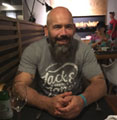
Danny Lloyd
I’m 44-years old, and after what I’ve been through, my mantra is now:
“The whole future lies in uncertainty; live immediately”.
I really got into sports from the age of fourteen when I played rugby in a school tournament. This led to an interest in weight training, and I even won third place in the Mr West Britain Contest in 1995. I had my sights set on more competitions when I was stopped in my tracks by APS.
I had been experiencing nondescript and odd symptoms, but it was discovered that I had suffered mini-strokes and kidney damage after my diagnosis. I was put on anticoagulants but still had fatigue and muscle weakness that left me open to muscle tears, bruises and cuts.
This put a stop to the bodybuilding, but I turned my attention to Jujitsu and later Judo. However, this wasn’t really the best sport for me, as the anticoagulant treatment meant that I was very prone to injuries such as muscle tears, cuts and bruises. Instead, I focused on road cycling and the benefits of yoga.
Christmas 2012 was a life-changing period for me. Following a couple of very difficult years emotionally, I came down with what I thought was a bug, and things went from bad to worse.
I went to bed on New Year’s Eve and woke around 5am, only to collapse with no coordination when I tried to get up. I remember an ambulance being called and being carried downstairs by the ambulance crew but, from then on, I have two to three months of odd memories: other patients, different wards, false memories, and bits of information other people have told me.
I had developed the worst-case scenario for anyone with APS: catastrophic APS (CAPS). During this time, I was frequently moved between a neurological ward, a high dependency unit, intensive care and a neighbouring specialist hospital. At the time, the mortality rate for CAPS was 50%.
I suffered a stroke, kidney damage due to haemorrhage, adrenal haemorrhage, which caused me to become adrenally insufficient (Addison’s disease), and the neurological infections of hydrocephalus and ventriculitis, which both caused further brain damage.
Initially, day-to-day things became impossible and often left me terrified. I was unable to do anything for myself and had to re-learn things I had taken for granted since childhood, such as speaking and sitting up.
My progression in rehab was slow and frustrating, but I drew on my persistent nature and started swimming initially. I felt safer when swimming as I was constantly in fear of falling due to my balance being impaired. I then worked on a treadmill and exercise bike.
My support worker set me the goal of attending a spinning class within a few months. My balance was and still is a massive issue, but I managed to hit the goal we set and two years on, we both still attend the weekly spin session.
However, the most significant turning point in my rehab was my discovery of Tai Chi. I was far from impressed with the idea to begin with, though, and remember saying: “no way was I doing exercise for old people!” After ten minutes, I was impressed and hooked – I’d found my calling at last. The progress and difference in my day-to-day ability is massive.
I believe that being physically active has given me back a life worth living. During my hospitalisation, I complained all the time that I’d looked after myself, ate well, and kept fit, yet this had happened to me, so what was the point. Yet, I remember a nurse, probably sick of my complaining, saying, “ever thought you might not still be here if you hadn’t?”
I am now a believer in Stoicism, and my personal philosophy is that the difficulties we overcome do, in fact, build and demonstrate a person’s character. We each have power over our own minds, but not outside events; we must simply identify and separate matters into that outside of our control and those we have a choice over.
I realise that if I can survive what I did and live the rewarding full life I now do, despite my difficulties, I can do pretty much anything.
Eddie Mackay
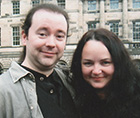
Eddie Mackay
My name is Edward Mackay, Eddie. In 2004 I turned thirty years of age. I was a fit and healthy non-drinker/non-smoker who worked for the local wildlife trust. In December of that year I was bedridden and diagnosed with flu. I don't remember much of this as the fatigue, the worst limb pain I had ever experienced and the difficulty concentrating because of the headaches makes this period a bit hazy for me. After about a week I was back on my feet but on the evening of 27th January 2005, over the course of one and a half hours, my left leg went from being a bit sore to landing me in A&E with a full leg DVT.
A few days later I was given a diagnosis of antiphospholipid syndrome.
For the first six years, having no real understanding just what this diagnosis meant, I complained about headaches, visual disturbances, difficulties concentrating and remembering things, my left leg that suffered the extensive DVT was still swelling and causing pain and a general ache and fatigue that seems to run from head to toe. During this time after seeing many consultants and getting no real answers, I discovered the Hughes Syndrome Foundation website. The information helped me focus my questions to my GP, and this in turn got me referred to a consultant with knowledge of Hughes syndrome. She addressed my concerns, ruling out any other underlying causes to my symptoms.
The difficulties I experience still make the simplest day to day tasks difficult most days and impossible on others. A twist to my story is my mother, in her early 70s, was diagnosed with Hughes syndrome in June of this year (2014) and, despite the family link and the near identical symptoms, it still took over two months for her to be tested for Hughes syndrome resulting in serious clotting in her lungs and head. She is slowly coming to terms with the difficulties that she has watched me go through for the past nine and a half years, experiencing them herself now.
Hopefully my story and that of my mother can help a little and encourage anyone, male or female, to get tested as soon as possible if they experience any of the symptoms that can relate to APS.
Anne Newman
I have had migraines since childhood, although they were not considered a particular problem until recognised as a feature of APS much later when I was finally diagnosed twenty years ago. As I wasn’t believed during adolescence, I felt humiliated and confused so I did all I could to deny or hide my visual disturbances, until I couldn’t manage in the classroom and had to go to the ‘sick bay’ with painful headaches.
In my twenties, the migraines seemed to sub-side and I had no reason to suspect I should be concerned about pregnancy, until I attended an ante natal class. When I said to the group that I didn’t feel my baby moving much, the midwife taking the class commented “oh” and looked a little concerned, but offered no advice.
Shortly after, I was admitted to hospital, diagnosed with severe pre-eclampsia and my daughter was born pre- term at the Whittington in London at six months gestation, under general anaesthetic. She was growth restricted and weighed 2lbs and 2ozs. I could hold her in one hand as her length was from my middle fingertip to an inch down my wrist. She was cared for in the neonatal unit and discharged six weeks later.
The following year, having adjusted to parenthood, my husband and I thought about a sibling for our daughter and were referred to a high-risk pregnancy clinic. A consultant haematologist was present and having considered my symptoms she told me that she couldn’t discount further pregnancy complications and asked us if we were sure we wanted to try again. As the risk to my daughter and I had been so high, we decided against any more birth children and thought us fortunate to have a child at all. The consultant took me on as a patient at her clinic and, having formally diagnosed me with APS, prescribed aspirin. It seemed so simple given all the previous difficulties we had experienced as a family.
I had a TIA three years later, which then caused a seizure and I was subsequently prescribed warfarin and anticonvulsants to address the ongoing damage from the clot. My teeth broke as a result of the seizure and were fixed and now look better than the originals! Unfortunately, I was taken off the road which was really annoying, but safer for me and anyone else driving.
In the following years we decided as a family to begin an adoption assessment, but were advised we would most likely be refused on grounds of my ill health. Rather than challenge this, regretfully we withdrew as we weren’t as well informed as now. Truthfully, I wanted us all to avoid disappointment, particularly our daughter who would have been involved in the process and was growing up.
In the past few years the visual disturbances recurred and I was diagnosed with partial focus seizures. Once again, I was unable to drive for a year, but following a change in my treatment and enough tablets to make me rattle, I’m back driving again. I have recently celebrated my 58th birthday and our daughter is now 23, healthy and our joy.
Sangi Patel

Sangi Patel
I was rushed into St Thomas’ Hospital in London with suspected meningitis in November 2002 and discharged five days later with high dose pain relief. I was twenty years old and had to take time off from my university course as I simply could not function.
My symptoms were classic of meningitis with extreme photophobia, a very stiff neck, big rash and I honestly thought my head was going to explode!
Fortunately, Dr Graham Hughes was shown my scans as the medical staff were perplexed and, eventually, I was called into the Lupus Unit at St Thomas’ in February 2003 was tested, then diagnosed with APS.
Initially I was trialled on Plavix (clopidogrel), aspirin and Clexane (heparin) but, in 2004, I was eventually put onto warfarin.
It was all very difficult to comprehend and, as I didn’t know anything about APS at the time, part of me thought I would suddenly wake up not having it one day.
I continued to develop other medical conditions that now means I am on lifelong medication for a few things.
Day to day it does not bother me but, over the ten years, I have found it incredibly difficult to maintain my INR. Admittedly some of the reasons are my own fault and being complacent with the importance and gravity of risk the condition holds. When you have been on something for so long you go through phases of denial, or laziness, which isn’t acceptable but realistic.
It has been difficult and especially knowing I want a baby, it does make me worry despite all the amazing successful pregnancies.
Some treatments or medications I cannot have for managing my other medical conditions because I have to take warfarin, and trying to explain to people (non medical) about why etc can get quite tedious although I do appreciate people try and help. After a while one can become blasé and it's not until my INR is bad and my symptoms are troublesome that it rings home how much attention I do need to pay.
Despite these difficulties, I want other people with APS to know that they can go all guns blazing, full force ahead with their dreams and their life. I had a very tough time when I was diagnosed, but have achieved some amazing things in my life despite having APS.
I am pleased to say that I am still the only Asian female to lead a 1st Premier League Football Club. I am also now an internationally published author, and I’ve just been signed by a Casting Agency called BInspired.
I hope I can be of some inspiration to other people who have just been diagnosed.
Sarah Rowe
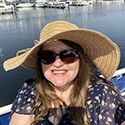
Sarah Rowe
My name is Sarah Rowe and here is my APS story.
When I was a teenager, I kept getting headaches. At first, an optician thought I just needed glasses and my doctor thought it was ‘just a phase’, but they kept getting worse. I would return time and time again to the GP surgery and they did order a few MRI scans, but they could not work out what was going on.
My headaches became so horrendous that my mother took me to see some private doctors as nothing would ease them. Those doctors were baffled too and suggested homoeopathic treatment.
As soon as I started university in 2006, I continued having these debilitating headaches and new ‘absent moments’ where I would feel like I might faint. The university doctor put it down to stress and told me to take over-the-counter anxiety medication. These episodes got steadily worse throughout my three years at university until the headaches turned into chronic pain down one side of my body. Once again, doctors could not understand what was happening and why.
After I graduated and returned to live at home whilst applying for teaching courses, I started having full seizures. The first one was particularly frightening as I woke up in a daze on the floor with paramedics standing over me, but I could not remember anything of what happened.
I remember the brilliant staff at Broomfield Hospital in Chelmsford ran many tests, but the only thing that stood out to them (other than tachycardia) was a kidney problem. However, they did also query whether I’d had a stroke. They then told me to ask my GP for a referral to a kidney specialist. Unfortunately, we lived in an area with a surgery that struggled to recruit, so it often had a lot of different locum doctors, which meant it was a real struggle to see one and even when you did, notes often got lost.
When I finally managed to see the primary practice doctor after going there every day for two weeks and waiting outside, he took one look at me and said, “You don’t have kidney problems.” This dismissal was just one of many along my APS journey, but I now know this is common for most autoimmune disease patients, particularly women. However, the doctors at the hospital had recommended this to me, so I wanted to persevere.
The GP eventually relented, which I am very thankful for as, upon seeing a nephrologist, they discovered that I did, in fact, have chronic kidney disease. Another few years of continued Accident and Emergency visits and multiple MRI scans, along with having seizures and a DVT, led me right back to my GP surgery.
When I finally got an appointment again, I demanded to be referred to the Louise Coote Lupus Unit at Guys and St Thomas’ Hospital. The doctor complied this time as he had been mistaken the time before. I had the wherewithal to fight to be seen and know where to refer myself to because my mum has Systemic Lupus Erythematosus (SLE), so I grew up with an awareness and was always very vigilant looking for signs of the disease. I didn’t want to take any chances and thought it could be pretty likely that I had it too.
After more years of various tests and scans and some costly dental procedures (in case my pain all down one side was due to that - which it wasn’t), I was finally diagnosed with antiphospholipid syndrome (APS). All of this (along with an awful bout of whooping cough) meant that my teaching career had been put on hold, but with a diagnosis, good kidney care and some medication, I was able to resume my training.
Today I am under the care of a Rheumatology team at Addenbrookes Hospital in Cambridge. I also follow a lot of APS groups on both Facebook and Instagram, which have proven to be invaluable. I find that I learn a lot from other people with the disease. Additionally, I have created my own Instagram page, ‘confessionsofalupuswarrior’ (APS was already taken!), which has been a really cathartic outlet.
My medication list has grown through the years, my chronic illness diagnosis has expanded (including arthritis and lupus), and I still have flare-ups. Still, I feel much better knowing where to turn for help and finally feeling heard after years of struggle with my illness is a wonderful thing!
Ann Sumra
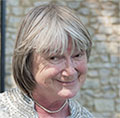
Ann Sumra
I am a 62 year old female and am a paediatric physiotherapist by profession and, up until my late 40s, was very active and fit.
About fifteen years ago I had an incident with a screamingly bad headache in the night. I took pain killers and went back to sleep. The next morning I felt strange on my right side, but my husband said I looked fine. I went to work, but my balance and coordination were poor.
On admission to hospital, nothing was found, although my right side has never felt quite right since. With hindsight, the doctors think I had a clot in my brain stem. I was working three part time jobs at the time, and was advised to give one up, which I did. I continued working at a school for children with moderate learning difficulties. I always felt fatigued, and had joint and muscle pains, but no one knew why, and all my test results were negative.
I just thought it was working and having a family. My balance and coordination were still not very good, and some days I found my memory was poor.
In June 2004, aged 54, the top of my right first finger looked like it had an infection. I ignored it until a couple of days later it started spreading. I went to the minor injuries unit, and was horrified to be told that it was a blood clot. A trip to casualty ensued, and a hospital stay on clot busting drugs.
Tests came back showing that I had a positive lupus anticoagulant, which is one of the tests for Hughes syndrome. I was put on the warfarin at a low dose, but it did not improve my symptoms. I was gradually getting what can only be described as ‘brain fog’, loss of memory, and terrible fatigue. Things on the family front were difficult at this time, and I found taking warfarin, the regular tests, and the risk of bleeding too much to deal with. My consultant let me come off the medication, on the proviso that I went straight back on if I had any more symptoms of a stroke or a clot.
I continued to work but it was a struggle. I was unable to process or write reports, could not remember things from day to day, could not add up and could not think how to set targets. I had problems on public transport and driving. I found it hard to remember where I was going, why and how to get there. When I was talking or writing about a child patient I could not remember them. I had to get my husband to add up my bills each month. I said to him, amid the tears, either I am going mad, or I have early onset Alzheimers. The fatigue was also terrible. I used to have to lie on the floor between treating the children, and often struggled to walk home. No one could help, although the doctors made sympathetic noises.
Finally, in July 2005, I made the decision to quit work, as it was not fair to anyone. Being self employed, there was no fall back or finances available, so the stress didn’t help. I could not physically continue sports such as tennis etc, and sometimes found it hard even to carry on a conversation. No one said Alzheimers, but I was very frightened and got depressed. I lost faith in myself. Counselling helped. My family were great, but it didn’t change the situation.
In September 2006, I started getting visual symptoms, and returned to my consultant, who insisted I started warfarin again. Each person on warfarin has a personal target known as INR. This is a measure of the thickness of the blood. Generally targets are quite low, because warfarin in excess can cause bleeding. When a person first starts warfarin they are often given heparin as well, which acts more quickly to raise blood levels. I went high, up to 4, by accident, and it was like a miracle. I woke up one morning feeling normal again. The symptoms of brain fog, fatigue, memory loss, and joint and muscle pains were really reduced. My consultant agreed that I could have a higher target of 4, which is what I now try to achieve.
But it is still a roller coaster ride trying to manage it. It can change from day to day, dependent on things like stress levels, diet, sleep, exercise, and all different things. The hardest thing I find to cope with is the unpredictability. Some days my mind is as sharp as a razor, and other days it is like mush for no apparent reason. But at least now I am learning to pace myself and watch my diet, I have days when I feel normal again. These days are getting more frequent, and it was such a relief when I discovered that I did not have Altzheimers.
The tests for Hughes syndrome are very simple and inexpensive. Three blood tests will show the presence of the antibodies, and it can be requested in the first instance by a GP. I am so glad that I had a young registrar who knew what to test for, and feel very blessed that I can live a relatively normal life.
I hope my story will help others who may be showing these symptoms at a relatively young age. Please go and be tested, because if you have Hughes syndrome you can really be helped.
Vicky Tabrett
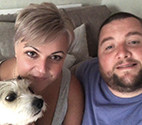
Vicky Tabrett
In July 2011, I had just completed my first year of university, it was the summer before I started my second year; I was in Ibiza on a girly holiday with my friends, we were having pre-drinks in our apartment, a few homemade cocktails before we headed out for the night.
I went to the bathroom and upon my return to the room I suddenly went very, very hot, my face was burning, then I started laughing hysterically, my friends kept asking me “ Vicky come on what’s funny, let us in on the joke” but I couldn’t because I couldn’t speak. Then they realised that something was wrong. I felt my face drop and it felt like my body just got very heavy, very suddenly. I couldn’t speak.
My friends had no idea what was going on, they called an emergency doctor who came and gave me an allergy shot in case it was an allergic reaction to something, he didn’t even check me over… everyone decided that if I wasn’t better by the morning then we were to go to the local hospital.
The following morning, after my friends took it in turns to watch me through the night, we walked to the local medical centre, this was when I first realised that I couldn’t walk, I was literally dragging my leg behind me. At breakfast I couldn’t hold a knife and fork, my right hand was completely sealed closed and numb. I was terrified and exhausted, and I couldn’t even speak to convey my fear.
At the medical centre, the doctor asked my friends what had happened and they explained. The doctor didn’t even check me over, just stated it was probably alcohol poisoning, gave me vitamin B tablets, chamomile tea and sent me on my way. I carried on my holiday for 3 more days.
Obviously, by now all of my family had been informed, so when I got back to the UK, I was taken to the hospital pretty much as soon as I returned. They admitted me straight away for a full check-up and tests. This was when they diagnosed an ischemic stroke on the left-hand side of my brain, they noted numerous scars from TIAs on both sides of the brain. Blood tests revealed I had Primary antiphospholipid syndrome.
I was put on warfarin right away and admitted into the Stroke ward. I was the youngest person there by about 50 years. I was miserable. My stroke rehab started right away as did my speech therapy. I was hospitalised for over a month.
I could’ve given up, wallowed in self-pity. ‘Why me? Why has this happened to me?’, but I chose not to, I carried on. I went back to university in September, their amazing disability specialists put numerous programs in place so that I had assistance to get me through each lecture, including a specialist laptop with programs meaning I didn’t have to type my essays- talk type etc. It was amazing, because of all of this support I managed to graduate with my whole class in 2013.
I continued to have all of my stroke rehab, I had in total about 18 months of physical therapy and about 6-8 months of speech therapy. I left with some control of my right hand and was able to walk, on bad days I still walk with a stick. I still have absolutely no feeling in the right-hand side of my body, but you find a way to adapt, you have to. In terms of side effects of APS, I find that they are combined with the effects of the stroke.
The fatigue is crippling, I find having a set routine helps, it means I can hold down a part-time job, which is amazing and my company are very accommodating to my reasonable adjustments.
I have zero vitamin B, so I have to inject myself every 3 months with a concentrated dose. I also take iron tablets, this combination I find helps but it’s not a cure. There are days when I cannot get out of bed, I’m just exhausted, it’s just how it is, I have learned to cope.
Migraines are something else that I have to combat, there’s nothing I have found that helps other than, 4head stick, a cooling migraine strip and sleep. The more stressed I get, the more frequent they are.
Raynaud’s phenomenon, this I actually had numerous years before, I first noticed this in 2008, my hands were always cold, then my feet and face. I was prescribed medication, but I found it didn’t help at all, it’s still agony when the blood returns but again something I cope with. I wear gloves to bed in the winter.
Livedo reticularis, this is the mottled net rash, I’ve not found this to be an issue other than the fact it looks a bit grim, I find it becomes more prominent with temperature changes.
Brain fog, confusion, memory loss, I get very confused a lot of the time and my memory is atrocious, I have to write everything down all the time. Photographs help but even then, I wish I had the organic memories.
So in the grand scheme of things I manage my life every day the best way I can.
I fell in love and met the man who’s now my husband in my second year of university, he never knew me before the stroke, so he understands everything, every quirk-and completely supports me, yes we have challenging days but what marriage doesn’t?
We decided we wanted to try and have a child, I had my Mirena coil removed. We didn't fall pregnant in 2 years so I went to the doctors, they said that it might have been because I had been on warfarin for so long. So my anti-coag clinic swapped me to daltaparin. However they advised me to stop warfarin for 3 days and in the 4th day to start the injections….
On the third day I had a heart attack, I had a clot next to my heart. So I was immediately put back into warfarin and advised never to come off it again. There goes my chance of having children. My husband and I have come to terms with that, it was hard but again something we have had to deal with. So now we have a little rescue dog called Gibbs, he’s our child.
After a while I realised that my periods were very, very heavy and painful. So I went to my specialist at St Thomas hospital, Dr Breen, she advised that if children were definitely out of the question then there was a procedure called an ablation that I could consider- she referred me to gynaecology. I met with them, we discussed it and I agreed that it’s worth the risk so I went for all the tests.
Upon the initial testing, they found something on my left ovary, they thought it was a cyst- after an MRI, they found it was a 27x16cm tumour and it would need to be removed surgically asap. I was treated at the cancer centre at Guys and St Thomas, as you can imagine I was terrified. Not only was I battling the idea of potentially having cancer but I knew they were going to have to take me off warfarin in order to do so. I had the laparotomy in December 2019, they removed my left ovary, Fallopian tube, the tumour and did an ablation all at the same time. The tumour was benign thank goodness and I’m still recovering now.
However that is not the end of my story, on top of all of this, and starting from numerous years ago to the last 2 weeks, I was having ‘incidents’ or ‘funny turns’ in my sleep, my husband was terrified and called ambulances each time, I had CT scans and it wasn’t a stroke caused by a bleed; but after seeing a stroke specialist, I have been preliminarily diagnosed with complex absence seizures, apparently based on the damage the stroke caused 9 years ago.?!
I have had to surrender my driving licence, give back my Motability car and wait for my next lot of meds to control them, I have another long road ahead of me but I will get there. I know I will, I've come this far and I will continue because I am determined to live my best life.
I have set up a new Instagram page to give advice and document my life and my journey a.p.s_warrior I want it known that APS is something you have and not something you are. It might dictate your mood and some of your actions but it does not DEFINE YOU!! Best of luck to you all in your journeys xxx
2022 Update:
I found out that complex absence seizures were actually incorrect; they became violent tonic-clonic seizures in my sleep. I was put on seizure meds and hoped for the best. I was still having ‘funny turns’. After tests, I was diagnosed with vertigo and PoTs. My blood pressure was either going too high or too low, and I was unable to see and focus and needed to be sick. There is no treatment for that except to de-stress (It was exasperated by stress). A year later, I became seizure-free,
Then my memory became more of an issue. I had neuropsychological testing as damage to the memory centre has been linked to APS. The assessment came back with severe memory deficiency and consistent aphasia. Apparently, I don't have a ‘filter’. If I think it, I say it, no matter how inappropriate it may be.
I finally thought there was a light at the end of the tunnel, and then my balance started to be affected randomly. I would stand, go dizzy and fall over. They found out I had severe hearing loss in my stroke side ear during those tests, so I’m getting a hearing aid and then going back for balance tests.
I was hoping that would be it, but they found another mass in my right ovary. It’s large, so they have to remove it; they may have to take my other ovary too, sending me into menopause at 35. I’m devastated, to be honest.
APS is just a horrible gift that keeps giving, but I’m still working, I’m still fighting, I’m still pushing forward with my life, and I will continue to do so. We only get one life, and it’s so important to live it!
Keep fighting, warriors! Remember that you have to keep pushing forward because tomorrow is another day, and it’s quite possibly a better one than today.
Lucy Thomas
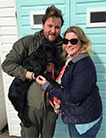
Lucy Thomas
I’d always been lead to believe that I wouldn’t be able to conceive, as I have Polycystic Ovary Syndrome. My husband and I had been together ten years, and we’d always assumed we wouldn’t be able to start a family of our own. However, after returning from Australia to visit our new nephew, we decided we’d like to try for a family, and planned to see a fertility specialist; so it came as a great and welcome surprise that I suddenly fell pregnant in January 2014, without any intervention.
I had a bleed at about eight weeks but, otherwise, the pregnancy was going according to plan. Then, in July 2014, at 29 weeks pregnant, everything changed. During a routine midwife appointment, she was concerned about the size of our baby. I was sent to the hospital for a Doppler scan - we weren’t prepared for everything that was about to unfold…
A few days later, I suffered a placental abruption and it was decided that I needed an emergency Caesarean. My husband was called and rushed to be by my side for the birth of our daughter but, after further complications, was told he couldn’t stay in the room.
I was put under a general anaesthetic, my husband kissed my forehead, and the next thing I remember is waking up with my sister and husband looking over me. I asked where Isabelle was. My husband broke it to me that Isabelle had died during delivery. She was born weighing 880 grams – which we later learnt was classified as a low birth weight baby or the technical term: IUGR – Intra-Uterine Growth Restriction.
The recovery from the surgery was slow. My legs and abdomen had swollen and I couldn’t walk for five days. I stayed in hospital during this time and over the coming days and weeks, I found it increasingly difficult to breathe and stand up straight. I had chest pains that were quickly attributed to referred pain from the operation. As I had never had surgery before, I didn’t know what to expect. I trusted that the medics knew what they were talking about and that I would be ok in a few days. Gradually, my condition deteriorated. I felt faint and anxious, I had sharp chest pains, and I couldn’t walk at more than a snail’s pace, nor straighten my back from a hunched over position.
One morning, three weeks after the surgery, I woke up with a swelling feeling at the back of my right leg. There was no visible swelling, but something was not right. I went to my GP who sent me to hospital as a precaution, but the hospital consultant was keen to send me home - there was nothing visibly wrong with me. I persisted, however. I knew they’d missed something. In the end, he humoured me and said he’d get me a lung scan. I waited in hospital for a further three days for that scan. When it eventually came, it confirmed multiple bilateral pulmonary embolism – blood clots in both lungs.
Fast forward seven months, I have now been diagnosed with antiphospholipid syndrome (APS) and am on lifelong anticoagulation, which is not without its risks, but it outweighs the risks of the alternative. The sad thing is that under current guidelines, so many people have to endure the pain of losing three babies before they will even be considered for testing, despite a simple blood test being all that’s needed to confirm diagnosis in the majority of cases.
With increased awareness of APS amongst the medical profession and the wider community, I hope that people can recognise the signs and symptoms and end the needless suffering that so many families have to endure. A woman with APS has an 80% chance of a successful pregnancy if it is correctly diagnosed and treated.
We are lucky to have the support of wonderful family and friends – on Isabelle’s 1st birthday, they surprised us with a wonderful video, they’d all come together and made birthday cakes – with friends and family from Australia, New York, Madrid, France and the UK all involved. Not only that, but they had secretly been raising funds in memory of Isabelle.
Beth Willis

Beth Willis
I was an extremely fit and active 18-year-old when I was admitted to hospital with a suspected pulmonary embolism (PE). After a week on heparin injections I was sent home, being told that the symptoms were inconclusive and it was probably pleurisy. I was given some painkillers and no further tests were run. I was keen to get on with my A-levels and didn't ask any more questions.
My medical history at this point showed I had suffered badly from Glandular Fever at 13, I had been diagnosed with Reynaud's and had a history of skin rashes in hot weather, but these things were not looked into.
So I went off to University only to risk being thrown out because I started fainting all the time. Sometimes I would pass out several times a week and the rest of the time, I suffered from terrible dizziness. The concussions I was getting were sometimes quite bad and the University was worried about insurance and health and safety issues with me being there.
I was sent to a cardiologist who put me on different sorts of heart medication, including beta-blockers which seemed bizarre for a young woman with low blood pressure. All of the medicines I tried made me terribly unwell. One doctor even wanted to put a pacemaker in, but luckily my parents were very against this as there didn't seem to be any results that showed there was anything wrong with my heart.
I continued to get worse, still fainting and suffering severe dizziness, headaches and joint pain. I was sent to a neurologist who said (and I quote), "I'm tired of seeing these silly girls with neurotic mothers who are probably just anaemic and need some red meat".
Needless to say, I didn't go back to see him.
I managed somehow to graduate from University but was struggling. I was getting desperate and researched a doctor who was running trials on patients with fainting symptoms, and I managed to get referred to him.
I was admitted to the National Hospital for Neurology for a week and they ran a multitude of tests which were all inconclusive. They decided it could be a type of Vasovagal Syncope or vertigo and tried some more medication which once again made me sick.
I struggled with recurrent pleurisy, which left me out of action for months at a time. It was hard to maintain jobs and relationships, and even friends get bored after a while of your excuses. Luckily I have a close family and was able to rely on them, but not ideal as a young woman when all your peers are setting out into the world.
During a very bad pleurisy episode, I was taken to A&E and a young student doctor looked at my chart and asked if I'd been tested for lupus, which I'd never heard of. Tests were set in motion, which came back positive and I was then referred to a Rheumatologist who started me on new medication.
Although the fainting stopped and my blood pressure seemed to improve, my other symptoms were unchanged. This was obviously disappointing and I went back to the Rheumatologist several times complaining of terrible chest pains and shortness of breath. Not at any point during this did he order any scans or x-rays, and even told me that I was exaggerating and my chest pains were panic attacks. Once again, I was referred to as a 'silly girl'.
I went on to suffer a mini-stroke which was terrifying. I began to lose the feeling in the right side of my face, arm and right side of my body. Luckily I was rushed to hospital and put on heparin and within a matter of days had regained the use of my right side and suffered no lasting damage.
Even after this, no further tests were run and I was determined that things couldn't stay the same.
My family researched other hospitals and found that St Thomas' Hospital in London had a Lupus Clinic. I had to fight my local Primary Care Trust to get a referral and was turned down twice before they agreed to let me be seen in London. By the time my referral came through, I was suffering so severely from chest pain and shortness of breath, I couldn't climb a flight of stairs. My joints were in agony and my dizziness was so bad every day was a battle.
The doctor at St Thomas' took one look at me, called the nurse for a wheelchair and took me to the emergency room himself. They ran a VQ scan and discovered a mass of multiple PEs. The doctor told me he's never seen such large clots on a patient's scan that was still alive, a terrifying thing to hear.
They ran blood tests and I was diagnosed with high positive APS.
Unfortunately, the delay in diagnosis has left me with lung problems that will always be a battle. It's frustrating to think that this could have been avoided with a simple blood test at 18 or if any of the doctors that treated me over those seven years had picked up on my symptoms.
Since my diagnosis, I have rebuilt my life and manage my symptoms as well as I can. Medications such as warfarin and steroids have made a substantial difference, as have the fantastic doctors at St Thomas' Hospital.
Meeting other patients through APS Support UK has also played a huge part in helping me come to terms with and understand my condition.
Yvonne Wren
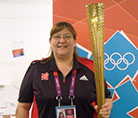
Yvonne Wren
I received confirmation of my diagnosis of antiphospholipid syndrome at St Thomas' Hospital on 21st April 2005. I was 52 years old.
I had never been someone who suffered from headaches but I had had a couple of migraine-type attacks through each of my two pregnancies in the 1980s and subsequently once or twice a year after that.
In 2003, aged 50, I suffered one of these attacks at work resulting in a severe headache, photophobia, flashing lights, fragmented vision, impaired memory, inability to process actions and failure to recognise my colleagues.
I thought I was having a stroke (I'm a physiotherapist so I knew the warning signs). My colleagues took me to the local A&E, but by the time I was seen, the symptoms were less and I was sent home. The whole episode was put down to 'stress' as I was in the middle of an extremely unpleasant divorce.
A week later, I was told I had swelling at the back of my eyes, following a routine eye appointment and sent back to A&E. No reason was given.
At this point, one of my oldest, dearest friends, who is a medical consultant, insisted on arranging for me to have an MRI scan. I was extremely reluctant for this to take place, but thank goodness I had one as it identified some lesions in my brain and I was referred to a neurologist. Again, I was extremely lucky that he knew about APS and considered it as a possible diagnosis and referred me to a haematologist.
Finally, 18 months after the major 'migraine-type episode I experienced at work and after numerous blood tests, I was diagnosed with APS. I was also started on large doses of warfarin (an anticoagulant), for life.
The management of the anticoagulation was undertaken by my local hospital anticoagulant clinic. The staff have always been brilliant and very supportive.
Unfortunately, the warfarin meant I had to make weekly visits to the clinic to monitor the INR (International Normalised Ratio), the measure of how quickly the blood will clot because if the dose is not right you could be at risk of clotting or bleeding.
After a year of taking warfarin, I had a big win at Bingo and bought my own monitoring machine (£400, although it now costs only £300!) so I can regularly see what the INR is and adjust my Warfarin dose accordingly. This has been totally liberating. I have been everywhere with my Coaguchek XS machine with the knowledge that I can keep an eye on what my blood is doing! Unfortunately, so many things affect the action of warfarin, including green vegetables, some herbs, strenuous exercise, disturbed sleep, some prescription medicines, long-distance travel and alcohol, so it is great that I can monitor my blood without time-consuming visits to the clinics and adjust the warfarin doses to keep within my therapeutic range.
When I initially received the APS diagnosis I was relieved that my memory problems were not caused by dementia but worried about the long term implications and the life-threatening risks associated with the disease and the warfarin. Around the same time, I was also diagnosed with hypothyroidism and felt fairly exhausted and unwell, still working full time and dealing with the divorce.
It took me a few years of support from the health professionals and my family and dear friends to realise that life can be full and fulfilling. Through all the health issues from the APS, I have recovered from the divorce, dealt with hospital admissions and bereavement but also learnt to manage the condition now and enjoy life; becoming a driver Games Maker for the London 2012 Olympics, learning to play a steel pan with the Croydon Steel Orchestra and travelling extensively to places such as Iceland, Hawaii and Las Vegas, as well as many other activities.
Be a media volunteer
One of our charity’s main aims is to raise awareness of APS - both amongst healthcare workers and the general public.
Donate by text
Text APSUK and the amount you wish to donate to 70085.
For example, to donate £5 you would text APSUK5 and send to 70085.

